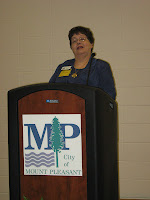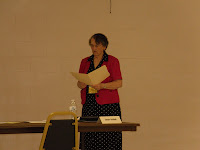by Katie Hines
As writers, we're all familiar with those oh-so-inconvenient problems with our computers. Here's a rather humorous take on some of the problems I've had!
I’ve
been having head-banging-against-the-wall computer difficulties. When my husband unplugged my daughter’s
computer (W2K Pro) to move it, he didn’t know her password was timing out and
would soon be deleted by the system, and that waiting to reconnect would result
in big time log-in problems.
But
the CPU’s insidious memory chuckled mercilessly as it counted down the hours,
then minutes, to lock out – and when it reached “zero,” it did just that.
Old
passwords no longer worked and I entered every password, and variation thereof,
I could think of. No luck.
An
epiphany: log on as “guest.” Epiphany wasted. The “guest” function was unavailable.
I
spent two days in an eye-crossing search of the internet for a solution. I’ve encountered BIOS, read not to mess with BIOS,
and learned that passwords used in restarting the computer have nothing whatsoever
to do with the Windows user names and passwords.
Furthermore,
the Windows administrator – who is God in the computer system - is missing, and
I’ve learned that she hides behind strange codes and locked doors that one must
have the correct computer key to enter.
I’ve
discovered NTFS and SCSI-controllers, SAM and EFS files, CMOS and PDC, and all
sorts of other alphabetical gobbledygook that I thought only the military had a
patent on. Additionally, I’ve been trying
to figure out what the heck the PCI bus is and if I can ride it to the solution
to my problem.
Working
on my computer, I have downloaded zipped boot disk images and SCSI-drivers in
order to create a bypass disk. But, the install failed and a window said the
.exe file needed was not on the same path.
Huh?
So I
closed the window and doggone, there the .exe file was, staring at me from my
screen. Unfortunately, as I leaned
forward, my hand hit the wrong button and, just like a naughty child, the .exe
file ran away and is currently listed as “missing in action.”
My
woes didn’t end there. During the
process of downloading both programs found on the internet specifically
designed to help recover lost passwords, these rebellious programs linked to mirrors
that didn’t work or were so indecipherable in lingo that I hadn’t a clue what
to do.
I have punched the “help” button so many
times it has popped loose from my keyboard.
So what
results did all that tedious, mind-boggling reading uncover? It was very simple (as most computer answers
are – once you know them): W2K makes no
provision for recovering lost log-in administrator and user passwords in a
non-domain computer.
Since
I couldn’t get the recovery programs to work and didn’t want to pay big bucks
for non-freeware, the only option left was to do a clean install of W2K Pro,
which would erase all other programs and files.
Why
the heck couldn’t I have found this out in the first ten minutes of my search? It would have saved me the hospital expenses
incurred as a result of my head-banging concussion!
















